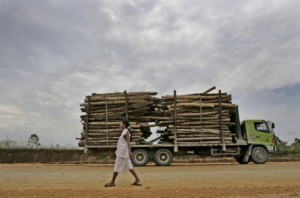
Jakarta Globe | 31 May 2010
Arti Ekawati & Reuters
Business leaders and even top government officials have been left surprised by President Susilo Bambang Yudhoyono’s announcement last week that the country would impose a two-year moratorium on the clearing of natural forests.
Meanwhile, the government added on Monday that even some existing licenses held by palm oil and timber firms would be revoked as part of the moratorium.
The developments have left many wondering what comes next for a range of development products, from a national plan to expand sugar production to the massive and controversial food estate in Merauke, Papua.
Deputy Agriculture Minister Bayu Krisnamurti expressed dismay at the moratorium: “I don’t know how such policy could be introduced.”
Bayu noted that the government had offered 1.2 million hectares of forest area in Merauke for large-scale food production.
In addition, he said, the Forestry Ministry had promised to provide as much as 500,000 hectares for expansion of sugar-cane plantations in the eastern half of the country with the goal of reaching self-sufficiency by 2014.
The moratorium “will clearly hamper development of the two projects,” Bayu said, adding that the government would hold a meeting to discuss the best ways to proceed.
Yudhoyono’s announcement was part of a $1 billion deal with Norway to help preserve Indonesia’s forests as part of the global fight against climate change. Indonesia is the world’s third-largest producer of carbon emissions, largely through deforestation. It has pledged to cut carbon emissions by 26 percent by 2020, mostly in the forestry sector.
According to current regulations, forested land and peatland can legally be converted as long as it is in areas so certified. But green organizations have complained that non-forestry activities such as plantations and mining have hurt the environment.
Agus Purnomo, head of the secretariat of the National Climate Change Council, said the government would revoke existing forestry licenses held by palm oil and timber firms in the effort to save natural forests.
“The spirit of the agreement was to save the remaining natural forests and peatlands, and we will do whatever humanly possibly to make it happen, within the legal context of Indonesia,” he said. “If we have to go through cancellations in the court system, we will do it.”
Permit-holders will find out within six months whether their concessions will be honored, Agus said, but those who do not have a valid permit will not be compensated.
Part of the $1 billion pledged by Norway can be used to compensate companies who see their concessions canceled.
Also on Monday, Forestry Minister Zulkifli Hasan said the moratorium would begin in 2011-12 for peatlands and forests.
“During the moratorium, peatlands and forests cannot be converted for non-forestry purposes,” even if their land status allows conversion. “Non-forestry activity will only be allowed on arid and over-logged land.”
Industry Minister MS Hidayat was among those expressing concern about the government’s new direction, especially regarding sugar production. “We may still be able to get the needed land for sugar, but not as much as we planned earlier,” he said.
Derom Bangun, vice chairman of the Indonesian Palm Oil Board (DMSI), said the moratorium would cut the national rate of palm oil expansion in half over the next decade. He said compensating permit-holders may be “messy affair” involving huge payouts.
“Just the initial investment to clear the land can reach $3,000 to $5,000 a hectare alone. It is hard to see whether they can fully compensate,” Derom said. “It will be a messy, complicated affair.”











